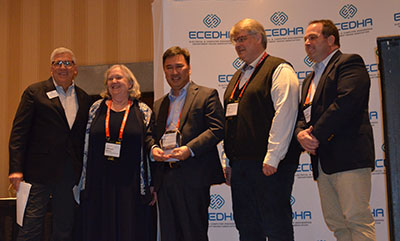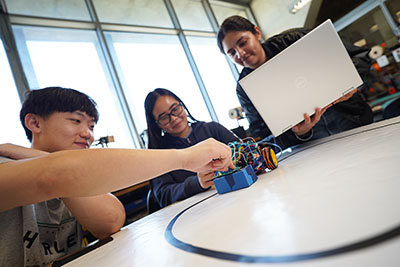Hands-on Electrical Engineering Curriculum at UC San Diego Earns Innovative Program Award
Electrical engineering student honor society also received Outstanding Chapter Award
Story by:
Published Date
Article Content
The Electrical and Computer Engineering Department at the University of California San Diego Jacobs School of Engineering was recognized for its pioneering hands-on lab curriculum by the Electrical and Computer Engineering Department Heads Association (ECEDHA). ECEDHA is the leading association for electrical and computer engineering educators in North America.
UC San Diego’s hands-on, project-based and experiential course curriculum all four years of undergraduate study was awarded the ECEDHA’s Innovative Program Award for 2024. This award is given to one individual or department that has created, implemented and sustained a program that has produced measurable improvements in the quality of the electrical and computer engineering education received by a significant number of students.
With classes like the introductory Experience ECE: Making, Breaking and Hacking Stuff; to Rapid Hardware & Software Design; and Art of Product Engineering, students have the opportunity to take at least one of these project-based lab courses every year. The curriculum culminates with two senior capstone project courses, in which students work in teams to complete an industry or academic-sponsored real-world project.
The UC San Diego Electrical and Computer Engineering department was honored not just for pioneering such an innovative curriculum, but for actively working to share their resources and serve as a model that has been adopted by other institutions around the country. This includes active partnerships with several local community colleges, to ensure students have exposure to these topics before transferring to a four-year institution.
“It is an honor to be recognized by our electrical engineering peers for the impact this curriculum has had and will continue to have on countless students and on the field of engineering education itself,” said Bill Lin, Professor and Chair of the Department of Electrical and Computer Engineering. “The hands-on, project-based courses developed at UC San Diego serve as a model for engaging students early and continuously with real-world applications of engineering theories and principles.”

While the department had offered lab-based courses for years, in 2016 it launched its introductory ECE5: Making, Breaking and Hacking Stuff course for first-year students. The goal was to give freshmen students confidence, motivation, and insight into what is to come in the rest of their undergraduate careers through a series of hands-on projects. The course consists of four main labs covering four emphases within electrical engineering: Communication, Analog Circuits, Digital Signal/Image Processing, and Embedded Systems and Control. Each lab is a hands-on project that gives students a high-level overview of what each topic encompasses. For example, students learn about communications using light by programming microcontrollers with sensors and LEDs.
After the success of ECE5, the department introduced a series of seven other hands-on, project-based courses, with students building and testing everything from LABView programming applications, to mechatronics, and videogame controllers.
“During my time as department chair, I heard from our industry partners that what was really needed was students who had hands-on skills that could be applied to internships from day one,” said Truong Nguyen, professor and former chair of the Department of Electrical and Computer Engineering, who championed the development and launch of the hands-on curriculum along with faculty, teaching assistants, and student organizations. “At the same time, I was hearing from students who wanted a more engaging, personalized experience. Small classes with team-based projects met both needs, and it’s been gratifying to see the hands-on curriculum evolve and continue to be so well-received by students, industry, and other engineering educators.”

The courses are held in one of two labs: the Department’s own Electrical and Computer Engineering Makerspace, or the broader EnVision Arts and Engineering Maker Studio. Both prototyping labs are equipped with a variety of design and fabrication tools available for student use, including 3D printers, laser cutters, soldering stations, drill presses, a PCB oven and more.
“These hands-on classes are some of my favorite to teach, because you can see how much the students love these courses, and how these projects help provide concrete guidance about which concentrations within electrical and computer engineering they are most interested in,” said Karcher Morris, an electrical engineering teaching professor who teaches several courses in this hands-on sequence. “As faculty, we take the feedback we receive from students seriously, and work to keep the courses fresh and evolving as tools and techniques in the field change.”

Student Success
The success of this curriculum doesn’t stop in the classroom. The team-based approach to the courses also fosters a deeper sense of community among students, evidenced in the student organizations and department camaraderie. One such organization, the Eta Kappa Nu (HKN) electrical engineering honor society, received the Outstanding Chapter Award at the ECEDHA conference. The chapter was recognized for their efforts to promote technical, professional, and academic development, as well as fostering social connections among student members.
“The transition back to in-person activities was extremely challenging for our organization, as we had lost significant institutional knowledge and valuable connections. However, this year, our executive board united to establish several ambitious goals. For the first time since the pandemic, we hosted our annual Honors Career Fair, invited numerous elementary and middle schools for campus tours as part of the ECE 198 course, led a highly successful ECE Day in collaboration with ECE Department and other student organizations, and tripled the number of our events, leveraging and building faculty and industry connections,” said Annie Liu, co-president of HKN. “I am incredibly proud of each one of our 58 officers. Their dedication and hard work are making huge waves in the engineering community at UC San Diego and beyond, and I am grateful for their commitment and enthusiasm.”
Share This:
You May Also Like
Stay in the Know
Keep up with all the latest from UC San Diego. Subscribe to the newsletter today.




